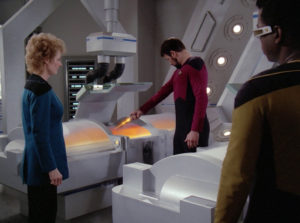Honest Sci-Fi Honors Life
You may have read or seen more sci-fi stories than I have.
But save for one crummy little Star Trek: The Next Generation TV moment, I can’t think of any human-spirit-honoring futuristic fiction that denies the value of life.
Even the weird life. Even the monster’s life.
‘To seek out new life …’
In “Doctor Who,” the Doctor saves every life he can. Even monsters. When a monster dies, such as the Minotaur in the series 6 episode “The God Complex,” it’s a tragedy. But sad is happy — or if not happy, challenging — for deep people. “Doctor Who” dares to go deeper, to the point of the Doctor flirting with pacifism rather than destroy even genocidal aliens.
Every iteration of Star Trek showcases honor for life, even if the heroes aren’t sure it’s life.
In “The Quality of Life,” the Enterprise crew learns that several manmade tools have begun exhibiting signs of life according to every classical scientific definition. In that story:
In the observation lounge, Riker issues a direct order to release the transporter lock, but Data stands firm and will not do so, even if it means a court martial. He argues that sacrificing one lifeform for another is not justified, and based on his own experiences, he must believe that, like himself, the exocomps are alive—and therefore have the right to live.1
![“[Our decision today] will reach far beyond this courtroom and this one android. It could significantly redefine the boundaries of personal liberty and freedom: expanding them for some, savagely curtailing them for others.”](http://www.speculativefaith.lorehaven.com/wp-content/uploads/2014/01/startrektng_themeasureofaman_picardchooseslife.png)
“[Our decision today] could significantly redefine the boundaries of personal liberty and freedom: expanding them for some, savagely curtailing them for others.”
Which prompts the judge to ponder aloud the value of presuming life and freedom.
Is Data a machine? Yes. Is he the property of Starfleet? No. We’ve all been dancing around the basic issue: does Data have a soul? I don’t know that he has. I don’t know that I have! But I have got to give him the freedom to explore that question himself.2
This classically humanist philosophy proves that such humanism’s ethics are not so far from Christianity (yet Christianity came first). It also proves that Christianity is not alone in defending the value of confirmed human life, and the presumed value of life that just might be human. Beside Biblical Christians stands honest sci-fi stories throughout ages, stalwart and sure, defending — though they may know it not — the sacred worth of the imago Dei, God’s image in human beings. Life is sacred. It is precious. It must not be destroyed.
‘Our own bodies’?
Previously I alluded to one sci-fi exception — one of the sillier Star Trek: TNG stories. “Up the Long Ladder” sets up a monumentally poor allegory in which a dying extraterrestrial race tries to clone Commander Riker and Dr. Pulaski. Outraged, the two Starfleet officers beam to the lab and spy on their maturing, sleeping clones. After one look, they blast them.
Riker (angrily): “We certainly have a right to exercise control over our own bodies.”
Pulaski: “You’ll get no argument from me.”
One would hope that Pulaski, despite not lasting beyond season 2, found her way back to the founding principles on which Starfleet is based: to respect life and not interfere with its natural development, no matter how it got there. Fortunately Riker in later stories became much less of a selfish and homicidal jerk. Confronting his own clone (generated by a freak transporter accident), Riker was not so inclined to phase-blast Thomas Riker in cold blood.
Life vs. death
Here’s why Christians can’t make as a first principle that we are for culture or against culture: “culture” contradicts itself. “Culture” is a schizophrenic mess.
Our stories love and exalt human life, especially children. But in reality people worship false “freedom” even more, the kind that crushes others’ freedom before they even experience it.
Our stories increasingly explore the horrors of dystopian societies in which all-powerful government leaders practice eugenics, worship power, and manipulate or even kill the weak to favor the living. Yet we support leaders who brazenly defend these very evils.
For the weak and unborn, the dystopia isn’t future. It’s already here.
Why do humans do this?
Answers can only start with this: only the spiritually dead could invent such ways to do evil against life. And only One can seek out new life among the dead.
- “The Quality of Life” episode summary at Memory-Alpha.org; emphasis added. ↩
- “The Measure of a Man” episode summary at Memory-Alpha.org. ↩











































Well said. Thanks
When I was thinking about this, Stephen, the only thing I could think of that contradicted this really was the mini-series “V” where a teenage girl slept with a Visitor and the resistance came together to secure an abortion for her. So the resistance had its leader (who was a doctor) take the risk of being captured to go into a Hospital to perform the abortion. (Because, being pro-choice is important enough to lose your leader over.)
However, when I think about it further, it actually did work itself in favor of life. They couldn’t do the abortion because the half human half alien babies couldn’t be aborted without killing the mother. So the pregnancy continued. At the end of the day, the baby who was born (one died in child birth) ended up the key to saving the whole planet. And the priest who worked so hard to save her was really a hero.
The only other ones I can think of is an episode of Star Trek: TNG, “Half a Life” which features a planet that has euthanasia. Counselor Troi’s mother falls in love with a man from the planet and he decides to try to defy the law that he must be euthanized at 60. He ends up going ahead with it. It’s sad for her but it’s treated as just a cultural decision rather than something that’s blatantly wrong. There was also an episode of the original series where an overpopulated planet had young people volunteer to spread a plague and the overall portrayal of the decision was sympathetic.
But in general, you’re right Sci Fi does affirm the value of life and even in situations where general society is taking steps away from it. While our civilization is moving towards “Brave New World” bioethical changes, sci fi usually says no. “Parts: The Clonus Horror” and its ripoff “The Island” said no to making people for parts, and I also in that regard was impressed by the Series 2 episode of the new Doctor Who, “New Earth” where the doctor saved people who were being used to cure diseases by giving them every disease known.
Ah yes, I now recall that TNG episode. (So did Tim Frankovich below.) This seems another example of the often contradictory Prime Directive approach in all the Star Trek series. It’s impossible for characters to adhere to this high-sounding standard without either violating the boundaries of a good story, or plain morality. In fact, most Star Trek stories dealing with the “Prime Directive,” right up until the recent (and derivative) Star Trek Into Darkness film, use it simply to generate the conflict. Drama comes not from upholding the Directive, but excusing its violation.
In Doctor Who, another fantastically life-honoring story — again with the “simpler” goal of proving that something only might need life to be presumed worth saving! — was the series 6 two-parter “The Rebel Flesh”/”The Almost People.” Blimey, the honor-life theme is right there in the latter episode’s title. And of course, that arc continued straight into the storyline of (spoilers) Amy’s child being abducted.
Who are we kidding, the Prime Directive is more like the Prime Easily Disregarded Suggestion.
Indeed. Proving that while it may sound moral, and intended to prevent pollution or domination of other cultures, it cannot be a one-size-fits-all solution in any honest story with morally aware heroes.
Since I’ve been working my way back through TNG on Netflix lately, I have to add another stupid moment. Season 4, episode: “Half A Life.” The Enterprise aids a brilliant scientist from a world where all citizens are required to commit suicide at age 60. While Lwaxana Troi (of all people) argues for life throughout most of the episode, in the end, she succumbs to the crew’s Prime Directive/respect-other-cultures’-antilife-beliefs arguments and goes with the scientist to witness his suicide. Even though the scientist is on the verge of a discovery that could save his whole world from destruction. Utter nonsense. Oh, and there was an episode of Enterprise where the captain chewed out someone for daring to condemn sex slavery in an alien culture, but I can’t be bothered to look up the actual episode name.
But overall, you’re absolutely right. It’s these very themes that make the stupid moments stick out so blatantly.
One of the highest sci-fi affirmations of the value of life comes from the outstanding movie Gattaca. Can’t recommend that one highly enough.
All these abortion undertones reminds me of a friend of my high school math teacher. Her fetus had some kind of condition where the skull wasn’t forming, meaning it would be crushed to death during birth. She elected to keep the pregnancy out of pro-life sentiment, though I’m sure nobody would blame her for terminating. I thought her decision was weird/dumb, and this was still while I was pro-life-by-default. But even in the pro-choice camp, we wouldn’t be interested in stopping her, even though I’m sure we would feel the conflict of letting someone do something we thought was dumb. But I’m afraid that people like her will be held up as examples/reasons why a woman should never terminate, even if it tortures her to carry a future stillborn. The Bloggess had an abortion because her body wouldn’t naturally miscarry a solid month after her fetus’s heartbeat stopped. She had a breakdown.
Every rightful push for morality in culture has a push-too-far. For other folks the too-far is in presuming that every cry for more money for welfare, environmentalism, or Education is absolutely above challenge. For some pro-lifers, it’s the insistence that even in instances where the mother’s physical (not emotional or career) life is at stake, there is no way out. (Rare but tragic ectopic pregnancies are other examples.)
Notleia: I would not call what Blogess had an abortion. I’m so sorry she had a breakdown. The sorrow of a death in utero is tremendous.
My sister had a baby with trisomy 18 who was supposed to die at birth. Little Rebecca lived three days, long enough for all of us to have our picture taken with her. My sister was glad she carried her an extra month because that let her be a mother to Rebecca that month longer.
I’m glad your sister is happy, but I personally find that to be really morbid. I think in that situation I might end up going through the grieving process twice, once when I find out about the trisomy, knowing the baby would die, and again when the baby does die, and I couldn’t face that. I wouldn’t want anybody facing that if they didn’t elect to, which is why I’m pro-choice.
But you’d still be grieving twice, how is it different?
Nah, if I went the abortion route (I probably would), I don’t think I’d grieve a second time. Of course, I may be misjudging my reaction, but I think it would give me a sense of closure rather than second loss.
This is one thing that has always perplexed me: the rather inhuman presumption that abortion is, or could ever be, any kind of solution for women who find themselves in any kind of painful situation. Things are difficult and horrible enough for a woman with an unwanted pregnancy; why add this burdensome “choice” and then step back, callously, as if this is any kind of help to her?
That’s my nonfiction question. But as this is a site focused on fiction, I’m curious about “pro-choice” folks’ response to the honest sci-fi I’ve cited that defends human life — such as the wisdom of Captain Picard and Cmdr. Data, who don’t even believe they must prove it’s life to defend its presumed rights.
Actually, it can help some women, even if it’s just a little bit. There are many women who are deathly afraid of carrying their rapist’s baby and having a permanent tie to that event and that person. There are women who just can’t afford to support a child. I’ll go ahead and drop a link in here. Samantha didn’t write it to change minds, but I don’t quite share her scruple and hope that it makes a little dent: https://defeatingthedragons.wordpress.com/2013/10/19/ordeal-of-the-bitter-waters/.
I’m familiar with those reasons. However, I wonder about this wisdom as expressed through story by the hero of Star Trek: TNG, Captain Picard:
Does the view you’ve repeated not align with exactly the revised morality Picard condemned?
Are we not speaking not only of one person’s or group’s freedoms — e.g., women who are pregnant by whatever meants — but potential other lives as well? Does this have no bearing on the topic?
Moreover, shall we leave aside the issue of rape? It is a tragic and sickening truth that women fall victim to this hideous crime that may deserve death — on the part of the rapist — but does not apply to the vast majority of abortions in Western culture. Issues such as ectopic pregnancies are similarly tragic, but not the majority of cases — leaving us freer to discuss this with, well, at least slightly less stigma. 🙂
But it’s a little inconsistent if you argue for the exception of rape and nothing else. The rape-baby didn’t do anything deserving to be punished, after all. And is a raped woman’s anguish somehow more legitimate than the anguish of a woman who can’t afford a pregnancy, financially, emotionally, or medically? Motherhood isn’t a guaranteed happy-maker, you know.
At the end of it, I hold with Samantha that women are capable of weighing the pros and cons of whether they can afford a pregnancy and/or a child, and whether it’s good for the child. Do you think they don’t take into account what kind of quality of life their child might have? It basically comes down to that I don’t think life just for life’s sake is quite enough. Plus, I still think of fetuses as, well, fetuses. Ambiguously potential life, versus the drastically less ambiguous life that a woman has. If some women want to risk theirs for the sake of the potential life, then fine, but I can’t see it as quite moral to blithely trade off the mother’s concrete life, with family, friends, career, etc, for the fetus’s ambiguous one.
It’s not at all. It’s one thing to justify abortion in the sense of a real, direct threat to the mother’s life, or to end a pregnancy that would end naturally in the child’s death otherwise like the examples you gave. But you’re starting to move from this to “oh, the mom will be unhappy if she has the kid,” with behavior that has nothing to do with injury or serious risk.
If you don’t want the risk of a child changing your life, don’t have sex. Because sex is designed to produce children; the chemical bonding and pleasure are means to that end, not ends in themselves. It’s perfectly fine to allow for abortion in dire cases, but you don’t get to abort kids simply because you screwed up and acted irresponsibly.
What’s actually effective in reducing unwanted pregnancy is sex ed and birth control. Something like 80% of married women of childbearing age are on some form of birth control for family planning purposes. I much prefer everybody be on pills or IUDs or something than a conga line or whatever to the abortion clinic, but these things are NECESSARY far, far, far more often than not. It’s not herds of hoes who are getting these abortions.
That’s slippery, because nobody has a perfect life, and any determination of what kind of life is worth living is arbitrary. There have been many people who have wished for death and cursed the day of their birth — even wishing that their mother or their mother’s midwife had killed them out of the womb. That sentiment is found in the Bible (off the top of my head, I think in Job and in Ecclesiastes.)
It’s easier for me to see abortion as an objective moral reality than other things I was taught to hold Neo-Conservative/Evangelical opinion about. Salvation, for instance, is not experienced as a clean-cut, black-and-white, either-or reality. Abortion is. Check either that little radial, or check the one beneath it. Then click “Submit.” Despite how vastly complicated the reasons for the decision might be, the results are binary.
I think I agree. Nothing exists for its own sake. However, just because something is inadequate or incomplete on its own doesn’t mean that we have the right to destroy it or to deny whatever legitimate value or meaning it does carry.
Is this not a prejudice?
Sounds like you would disagree with Picard and Data, then, and a long tradition of thought among Christians and classical humanists that we must do all we can to protect even potential human life — individual, real lives, not academic abstracts (as DM notes about the Dr. Weston types).
A consistent Biblical Christian cannot be “pro-choice.” Not for long.
(Similarly, a consistent Biblical Christian cannot be greedy or racist.)
That line evokes my cynicism, because nobody’s ever fully consistent. And what “Biblical” means depends on who’s asking. If there’s value in inconsistent and self-contradictory stories like Star Trek, surely there is grace for us self-contradicting Christians, whether or not we inconsistently hold to any inconsistent theory of “Biblical” correctness.
Certainly not. But nevertheless Christians should seek consistency in belief and action not according to what activists claim but according to the character of the self-revealing Creator and Savior, Jesus. By definition “Christians” seek to be more like Jesus every day. If they ignore a challenge to their beliefs — for example, preferring to cling to old attitudes of racism or prejudice against anyone in the name of “rights” or “freedom” — their very salvation claims are suspect.
That’s a very serious charge, yes, but it’s one that every Christian should welcome: the chance to work out his own salvation with fear and trembling, based on faith that God is truly the One working it.
Earlier the apostle writes:
For the Christian it’s a glorious truth: if you’re in Christ you can’t go on habitually sinning . But if we do happen to sin, Jesus roots for us. Other Scriptures make it clear: He has people constantly helping to sharpen us, to get rid of the false notions we pick up on the way.
I don’t.
I merely suggest that it’s odd to bring up the rape issue about abortion as if that’s the prototypical cause behind anyone deciding in favor of it.
Oh, I guessed you were for the rape exception — a lot of people are. I have mixed emotions about the rape exception, because at least it’s a dent in the forced-birth thinking, but it is inconsistent and not helpful to women in the long run.
If I’m dealing with a rape victim, surely the first and only thing she needs is love, comfort, endorsement of her hurt and wounds, absolute refusal to let her feel guilty for the crime, and the desire to find the violator and have him punished to the fullest extent of the law. (In Romans 13, God endorses civil authorities to carry out a bit of His justice even in an unjust world.) Furthermore, Christ’s people must be the first to refute claims that any other “solution” is any substitute, and we must be the first to cry “woe” and eternal damnation against abusers and rapists, and the first to offer comfort, care, options, prayer and love to their victims.
I ended up reading an analysis of the Terri Schiavo case last night and came away with one main thought:
Despite the heavy government involvement, it boiled down to a family that disagreed over what someone would have wanted. How might this frightening disregard for life play out for those without family?
I don’t remember the details of Terry Shiavo, but not that long ago I was reading about Jali, I think her name is, the girl who went brain-dead after complications from a tonsillectomy. In Jali’s case, she’s gone. She will not recover. But the family wants her to keep breathing as long as a machine can make her. And I find that really, really morbid. I don’t quite see the point, the value, in life merely, only for life’s sake. I just can’t disregard quality of life.
That simple phrase “quality of life” brings up one question: who decides what quality of life is worth living and what isn’t?
That’s the question, isn’t it.
Man stumbles on the answer; the Christian only asks the question rhetorically. To Biblical Christians it’s clear Who answers such life-and-death questions. 🙂
Yes, a thousand times. “Culture” is an abstraction. There is no culture, just us, the sub-creators, continually framing and re-shaping our perceptions as we incarnate our beliefs to each other through communication.
C.S. Lewis in Out of the Silent Planet had a good rejoinder to a lot of science fiction that concerned itself about life. At the end, Weston tries to explain himself to the Oyarsa of mars. He talks about all he did as a way to preserve life.
The Oyarsa devastatingly breaks down his arguments. When he did things for life, he did it only for an abstract thing. That justified himself for all the death and the cruelty he was going to do; break a few eggs to make an omelet. What’s worse was that he didn’t even do it for any real conception of human life as a real thing in the larger sense. What form of life Weston did this for could barely be called even a life force, let alone a living thing.
This is a devastating critique of the idea of transhumanism, because it has the same issues. A lot of wrong was being done in order to promote something which ends up being completely alien to the life you wanted to preserve in the first place. Kind of like a fantasy where a person is so afraid of dying that they become undead to live forever; the life you want to prolong you lose anyways and become something an alien and a horror to it.
So even SF caring about life can not always be a good thing. Sometimes it’s just this abstract, nameless force that is called life, and caring about that can justify some harsh things. A really good point about this was made in Nancy Kress’s Beggars in Spain series: the hyper-intelligent Super Sleepless decided to “save” humanity by turning them non-human; they enabled people to gain nourishment through photosynthesis and made them plant-human hybrids. Nothing much was said in the book after that about what kind of hell that would be to feel yourself becoming that.
I agree. Good illustration.
I haven’t read enough classic SF to defend or criticize its portrayal of life, but I do think at its best moments Star Trek does incidentally defend a very monotheist view of existence and interference, even though for the most part it’s an atheist franchise by default.
Star Trek is actually fairly solidly against transhumanism. It inconsistently applies the view that humans do not have the authority to define or to redefine life.
I fully agree with you both.
Characters such as Dr. Weston, and their real-life counterparts, err hideously exactly because they redefine the definition of “life.” I could say that I’m fighting to save humanity by creating some technology to enable us to live forever, by downloading our consciousnesses and memories into computer. But then such a “life” is no longer human. I have created a monster. I’ve based my “morality” on a lie, not on truth. I’m making up a fantasy world in which I can become the hero.
Such is exactly what happens when we feign to defend “humanity” or specific, on-paper groups, rather than actual, individal cases based on reality.
That’s why I must challenge any efforts to dodge any aspect of the conversation. The well-meaning activists for “humanity” or particular groups, no matter their profession or philosophy — scientist, ethicist, activist, religionist — must never, ever be allowed to “answer” “We won’t talk about that,” or “If you talk about that, then you must hate Humanity or this Particular Group,” when they are confronted with the question: is what you’re destroying precious human life?
I always liked this quote by Gandalf in Lord of The Rings: “Many that live deserve death. Some that die deserve life. Can you give it to them, Frodo? Do not be too eager to deal out death in judgment. Even the very wise cannot see all ends.”
I would apply this to any life. How do we know what their life will be like? How they will impact the world, even by living only a couple days or months? We should not be so eager to hand out death because in our mind that person won’t live up to our quality or standards.
One of the youth leaders in my church years ago found out that she had a heart condition while pregnant with her first daughter. To carry her daughter to term and give birth would probably kill her. She and her husband chose to go through with the pregnancy. She died 3 days after her daughter was born. Today her daughter is an amazing teenage girl who lived because her mother died for her.
My best friend’s son was diagnosed with a rare chromosomal anomaly (at that time there were only 8 recorded cases in the entire world) at 24 weeks gestation. He would be born with many, many problems (if he even lived the full 9 months). At the time, my friend and her husband were not Christians. They were in shock and didn’t know what to do. Giving birth, then taking care of a high needs child did not fit in with their plans. So they considered abortion.
They knew they needed help and churches help people, right? So they went to the church located behind their house, accepted Jesus a week later and were baptized a month later. They chose to carry Alex to full term.
He was born and lived 10 months. He had lots of surgeries and went through more than many adults ever will.
But he also touched more people than most adults ever will either. They could not fit all the people who baby Alex had touched with his short life into that funeral parlor.
Through his life, God saved his parents and radically transformed them, touched an entire NICU, touched an entire church, a community, and many who hear his story.
None of this would have happened if he had just been aborted.
I personally know three women who chose to carry their children to full term, even though their children’s skulls would not form over the brain, thus the child would not live long, if they even lived to birth.
“Even the wise cannot see all ends.” But God can.
Theirs was to walk the path of life and to let God do what He would do.
Thanks for sharing those stories, Morgan. Good stuff.
Maybe this is an oversimplification of the issue, but under what circumstances is a baby ever a bad result? I’m going to offer up the suggestion: pretty much never.
“But about the emotional trauma…?”
“What about the quality of…?”
Bah. This comes from a dad with three children under nine, so I’ve done the baby thing fairly recently and often. Take a baby out with you. Everywhere you go you will create smiles. Everywhere. Every place you stop you will have someone, probably multiple someones, pause from their daily routine to take note, to make faces, and to, at the very least, smile.
A baby is a good result. It is a blessing and a smile creator.
People who miss that need to check their eyes, and their hearts.
Soon and very soon, I’m going to reference Parts: the clonus horror, Night Fright, Logan’s Run, and a variety of other B-Movie sci-fi and horror that taught an unregenerate me bioethics before I read my first passage of Scripture.